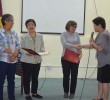Reference: Lorena Sanchez & Shirley Cuyugan-O’Brien, Coordinators, Philippine Forum-KABALIKAT, email: pf_kabalikat@yahoo.com
Consulate’s Partial Repatriation Concession for Fely Garcia Marks Victory for Domestic Workers Campaign
Domestic Workers Push for Fixed Assistance Policy from DFA, POEA, OWWA
New York– In a Filipino community townhall meeting held yesterday in Elmhurst, members of the domestic workers support network Philippine Forum-KABALIKAT and others realized the result of weeks of community-based campaign when a pinned-down Philippine Consulate announced it would offer $4900 in financial assistance towards the repatriation of Felisa “Fely” Garcia, a 58 year old Filipina domestic worker found dead in her home last March 14, 2007 in the Bronx. Philippine Forum-KABALIKAT members and their supporters also continued to pressure for a second round of investigation in a case that the New York Police Department has already dismissed as suicide with no sign of foul play. The said townhall was also attended by Philippine Vice Consul Leandro Lachica.
“Even I was surprised of the Consulate’s announcement for a small grant for Fely’s family,” states Atty. Arnedo Valera of the Migrant Heritage Legal Resource Center in Washington DC and chief legal counsel for the National Alliance for Filipino Concerns (NAFCON), who represents Garcia’s children in the Philippines and was also present at the townhall meeting. “Unfortunately, offering any concession of financial assistance to overseas Filipinos and their families in need is not normal or routine procedure for the Philippine government. It is administered under a so-called ‘case to case’ basis in the absence of a clear, fixed policy related to migrant worker assistance. It seems, as with the case of domestic worker Flor Contemplacion back in 1995, that the usual condition that pushes the Philippine government to react is when the community pressures in an uproar, or additionally in Fely’s case, when Philippine elections are in the air.”
“I congratulate the role of Philippine Forum-KABALIKAT, the Filipino community and specifically the domestic worker community in pressuring for this money to come through. Clearly it was the community’s response, not the goodwill of the Philippine government, that was the motivating force for the Consulate’s decision,” Valera added.
As a domestic worker organizing project of the Philippine Forum, an 11-year old community organization in Queens, KABALIKAT responded to Garcia’s reported death by securing US-based pro-bono legal representation for Garcia’s children through Valera, and since then have been fully-engaged in a campaign to push for the family’s demands for a re-investigation and full financial coverage of all death-related costs from the Philippine government, including a possible second autopsy, transportation to Batangas, and proper burial fees, not just for repatriation to Manila. A petition online administered by the network has garnered nearly 1000 signatures of support for Fely’s case.
“The authorities should listen to Fely’s children and their demand for a re-investigation. It is a reality that while abuse and exploitation is common for Filipino workers, most unfortunately opt to face these dismal conditions because they are the primary providers for their families back in the Philippines. Fely left behind four children back home with children of their own because she couldn’t make a decent living as teacher in the Philippines. We understand their frustration over the conduct of the initial investigation because they were never contacted by any authority until 2 weeks after her death,” states Philippine Forum-KABALIKAT co-coordinator Lorena Sanchez, a domestic worker who had initially worked in the Middle East before coming to work in New York.
Community members at the said meeting also pressured for a more fixed, comprehensive policy for financial assistance, legal assistance, and family compensation for overseas Filipino workers in need through funds allocated by the Philippine Overseas Employment Agency (POEA) Overseas Worker Welfare Administration (OWWA), and the Department of Foreign Affairs (DFA).
“While we welcome this financial offering by the Consulate, it really should be systematized into policy for these labor export agencies to offers various forms of assistance to overseas Filipinos when they need it. Overseas Filipinos pay remittances and excessive fees to these agencies. We all contribute to the Philippine economy whether we are documented residents, contract workers, and undocumented workers. Overseas Filipinos have been the backbone of the Philippine economy for over 30 years. The government should at least standardize safeguard measures of those in need,” Valera added.
Pinoy Life Abroad









